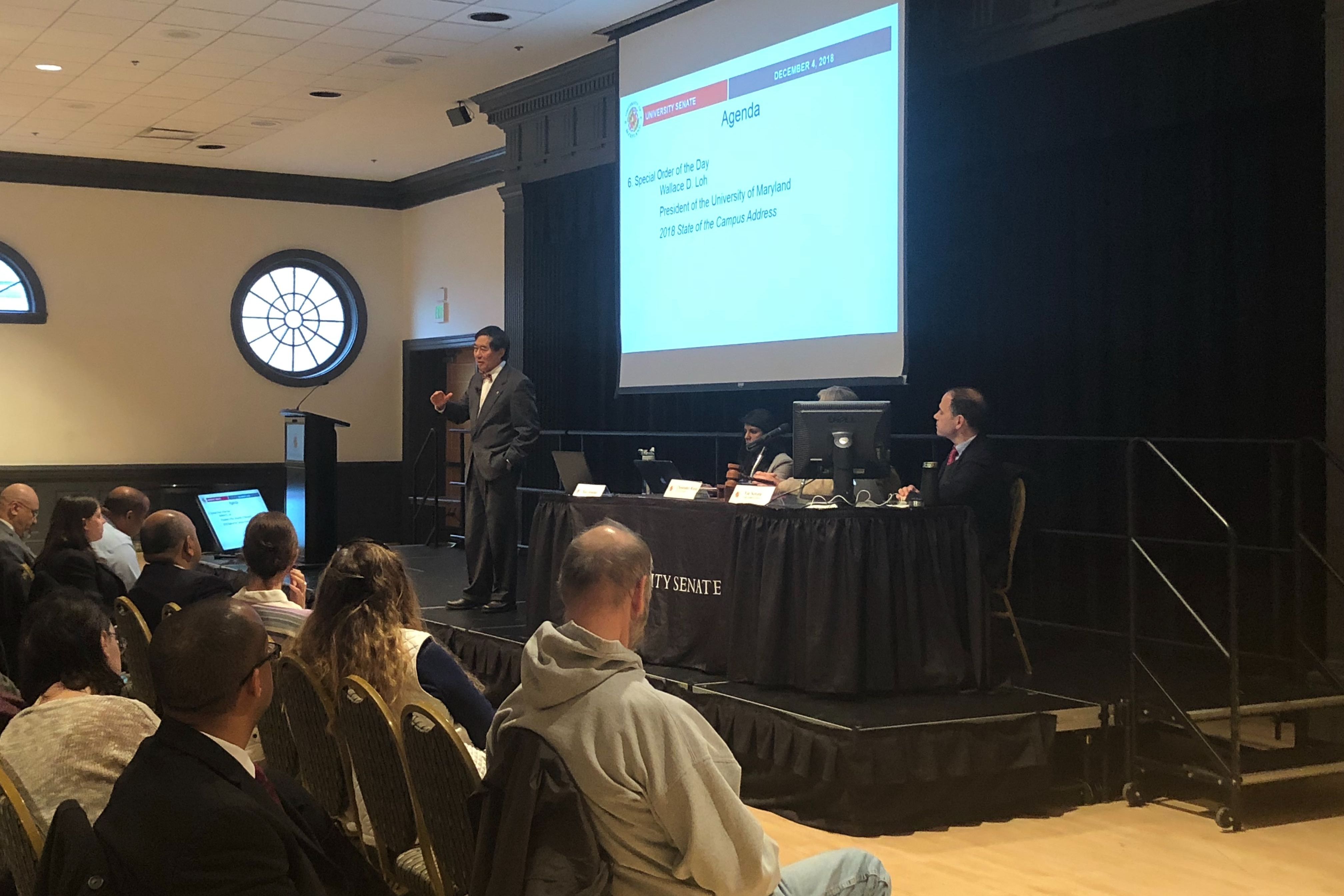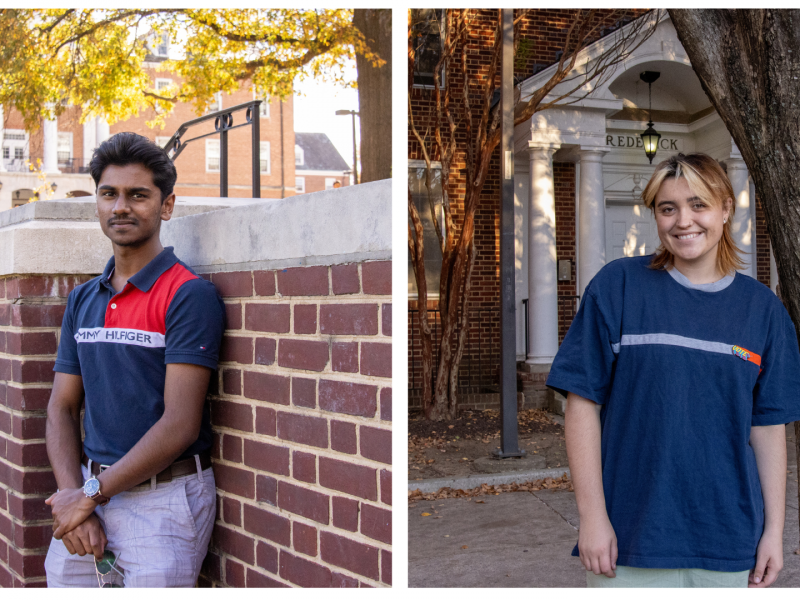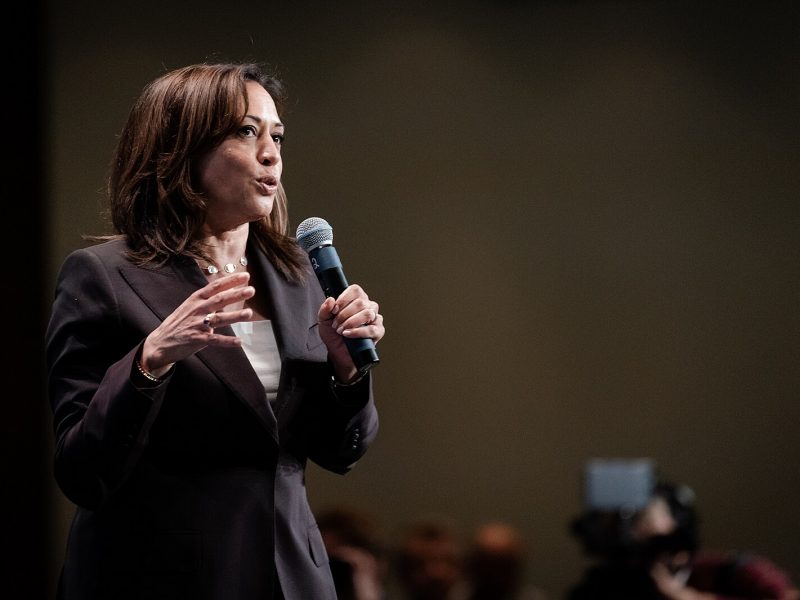With a rocky semester drawing to a close, University of Maryland President Wallace Loh gave his State of the Campus address during Tuesday’s University Senate meeting, criticizing the Board of Regents and reflecting on the progress the school has made under his leadership.
Loh was originally scheduled to speak Nov. 7 — one week after he fired football coach DJ Durkin against the wishes of the board, which sets policy for the University System of Maryland’s member institutions.
During his speech, he criticized the board, which recommended Durkin remain despite an investigation that found he failed to address an abusive environment on the team prior to the death of offensive lineman Jordan McNair.
“The whole idea is that the university has to be autonomous,” he said. “There cannot be decisions made by politically appointed representatives.”
[Read more: UMD President Wallace Loh is retiring. Here’s a look at his eight-year tenure.]
Loh said he told the board “all hell will break loose” if Durkin stayed, but he was reportedly offered an ultimatum: keep Durkin or be fired.
On the way to the press conference where the board announced its recommendations, Loh said he received a text from his wife: “You can always get another job, but you can never get back your integrity.”
He would announce his retirement shortly thereafter, effective June 2019. Though Loh would initially accept the board’s recommendation that Durkin remain, he fired him after fierce backlash from students, players and state officials.
“I’ve always said that athletics is the front porch of the university, but the front porch is not the most important,” Loh said. “What happens on the front porch can impact what happens in the rest of the house.”
SGA President Jonathan Allen said he agreed with Loh’s statements about the Board of Regents.
“The Board of Regents should not be a managing board, but a governing board,” Allen said.
[Read more: “That’s behind us”: UMD President Wallace Loh wants to move past the last two weeks]
Loh said he spoke over the weekend with representatives of the Big Ten athletic conference, who questioned the board’s involvement in the management of the university.
After McNair’s death in June, the university commissioned Dr. Rod Walters to investigate his care and the athletic department’s safety protocols. His investigation found that trainers repeatedly failed to recognize McNair’s condition and address his heatstroke, which is non-fatal when treated properly.
About half of the recommendations issues by Walters have been implemented as of now, Loh said.
The speech focused largely on campus improvements during Loh’s tenure. His comments on athletic department concerns didn’t come until the end, aggravating senators like Tyler Hoffman, a sophomore math major.
“Everybody knew what they really wanted to hear, but he saved athletics all the way towards the end,” Hoffman said. “I wish he put more focus on salient points like shared governance and athletics than he did.”
The speech also addressed other concerns from recent weeks, including a decline in African-American freshman enrollment, which is at its lowest in decades, according to the Office of Institutional Research, Planning and Assessment. This drop comes after the stabbing of Richard Collins, a visiting black student, in May 2017 and a spate of hate bias incidents.
Loh claimed that the number of African-American students attending this university has not gone down, if African-American transfers are included into the total of incoming students. But data from IRPA shows that over the past two years, African-American enrollment is down among both incoming freshmen and transfers.
And overall African-American enrollment has decreased. As of fall 2018, 4,387 African-American undergraduate and graduate students attend this university, down from 4,605 in fall 2017. The share of students who are African-American has dropped from 11.4 percent to 10.6 percent.
“We are one of the most diverse institutions of any public research institution in the country,” Loh said.
In addition, he said Provost Mary Ann Rankin is currently working with the deans of all the academic colleges to create a program centered in civic engagement.
It would focus on teaching students how to be responsible citizens beyond just voting, Loh said, by teaching skills like engaging with individuals who have different political views.
“Our job is not only to prepare students for work and for life, but I strongly believe that we also have to prepare students to be responsible citizens,” Loh said.
Loh also brought up the current fundraising campaign, which has a $1.5 billion goal. As of last week, the campaign has raised $985 million, he said.
Loh did not take questions at the end of his speech.



